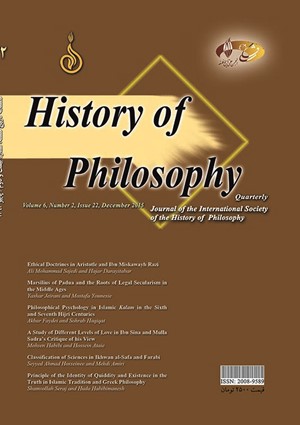Marsilius of Padua and the Roots of Legal Secularism in the Middle Ages
Subject Areas : Geneology of philosophical schools and IdeasYashar Jeirani 1 , Mostafa Younesie 2
1 -
2 -
Keywords: Marsilius of Padua secularism Middle Ages Christianity,
Abstract :
The present paper deals with the possibility of propounding the concept of “legal secularism” in the ideas of Marsilius of Padua. All commentators of Marsilius have detected a preliminary form of secularism, that is, institutionalized secularism, in his works and those of his contemporary scholars. This kind of secularism is opposed to the interference of the institution of the church as such in the field of politics. However, the same commentators have refused confirming a more advanced form of secularism in his works which is called legal secularism that is, one which is opposed to the interference of theological ideas as an official source with the laws. All commentators believe that this kind of secularism is rooted in the political philosophy of the modern period and, particularly, John Locke’s philosophy and maintain that attributing it to Marsilius is a kind of interpretive anachronism. Unlike the common theories, this paper aims to contradict this historistic interpretation of Marsilius’ political philosophy and, through analyzing his writings, demonstrate that his interpretation of faith as an inner and private affair can lead us toward a preliminary but clear form of legal secularism in his works.
Carlyle, A. J., A History of Medieval Political Theory in the West, vol. IV, V, VI, Barnes and Noble, 1922.#
Garnett, George, Marsilius of Padua and the Truth of History, Oxford University Press, 2006.#
Gerson Mreno-Riano & Cary J. Nederman (eds.), A Companion to Marsilius of Padua, Brill, 2011.#
Gewirth, Alan, Marsilius of Padua and Medieval Political Philosophy, New York, 1951.#
Hobbes, Thomas, Leviathan, Oxford University Press, 1996.#
Locke, John, A Letter Concerning Toleration, James H.Tully (ed.), Hacket, 1983.#
Marsilius of Padua, Defender of Peace, trans. by Annabel Brett, Cambridge University Press, 2005.#
Marsilius of Padua, Defensor minor and De translatione imperii, trans. by Cary J. Nederman, Camridge University Press, 1993.#
Skinner, Quentin, The Foundations of Modern Political Thought, vol. 1, The Renaissance, Cambridge University Press, 1978.#
Strauss, Leo & Joseph Cropsey (eds.), History of Political Philosophy, The University of Chicago Press, 1988 (Third Edition).#
Strauss, Leo, Persecution and Art of Writing, The University of Chicago Press, 1988.#
Strauss, Leo, How to Study Medieval Philosophy, 1944.#
Schmitt, Carl, The Leviathan in the State Theory of Thomas Hobbes: Meaning and Failure of a Political Symbol, trans. by George Schwab, Greenwood Press, 1996.#
Sullivan, Vickie, “Machiavelli’s Momentary Machiavellian Moment: A Reconsideration of Pocock’s Treatment of the Discourses”, Political Theory, vol. 20, No. 2 (May, 1992).#
Tierney, Brian (ed.), The Crisis of Church and State 1050-1300, University of Toronto Press, 1989.#
Tierney, Brian, Religion, Law, and the Growth of Constitutional Thought 1150-1650, Cambridge University Press, 1982.#
Thomas Aquinas, Summa Theologica, Benziger Brothers New York, 2006.#


